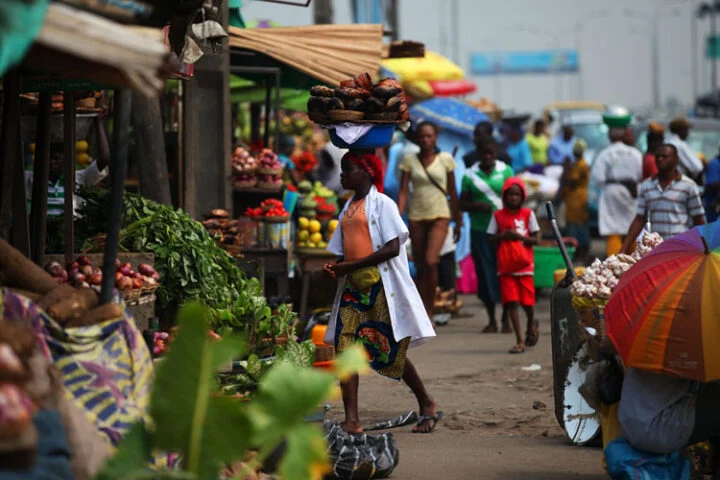Nigeria’s headline inflation rate eased for the fifth consecutive month in August 2025, providing some relief for consumers battling high living costs and economic uncertainty.
According to data released Monday by the National Bureau of Statistics (NBS), inflation slowed to 20.12%, down from 21.88% in July. This represents a 1.76 percentage point drop month-on-month and a significant decline from the 32.15% recorded in August 2024.
The Consumer Price Index (CPI), which tracks the average change in the prices of goods and services, rose marginally to 126.8 points in August from 125.9 points in July. Month-on-month inflation stood at 0.74%, significantly lower than the 1.99% recorded in the previous month, indicating a further deceleration in price increases across the country.
“The Consumer Price Index rose to 126.8 in August 2025, reflecting a 0.9-point increase from the preceding month (125.9). In August, the headline inflation rate eased to 20.12% compared to July’s 21.88%,” the NBS report stated.
Despite the moderation in overall inflation, the report highlights persistent disparities between urban and rural areas. Urban inflation dropped to 19.75% year-on-year in August, a steep fall from 34.58% a year earlier. Rural inflation was slightly higher at 20.28%, compared to 29.95% in August 2024. On a month-on-month basis, urban inflation slowed to 0.49% from 1.86% in July, while rural inflation eased to 1.38%, down from 2.30%. These figures suggest that while inflation is easing nationwide, rural communities continue to face sharper price pressures, largely due to transportation, distribution, and supply chain challenges.
Food inflation— the single largest driver of Nigeria’s inflation basket— also moderated, but remained elevated. The year-on-year food inflation rate dropped to 21.87% in August, down from 37.52% in August 2024. On a monthly basis, it fell to 1.65%, compared to 3.12% in July. The moderation was attributed to declining prices of key staples such as rice, guinea corn flour, maize flour, millet, semolina, and soya milk. The 12-month average food inflation stood at 25.75%, lower than the 36.99% recorded in the same period last year. However, food prices remain high, particularly in northern states, where insecurity and logistics disruptions continue to affect agricultural supply chains.
Core inflation, which excludes volatile items like food and energy, was recorded at 20.33% year-on-year in August, down from 27.58% in August 2024. However, on a month-on-month basis, it rose to 1.43%, up from 0.97% in July. This rise reflects persistent pressures in categories such as housing, water, electricity, gas, transport, education, and healthcare — a key concern for policymakers who monitor core inflation as an indicator of underlying structural inflation.
Inflationary trends varied across states. Ekiti recorded the highest year-on-year headline inflation at 28.17%, followed by Kano at 27.27%, and Oyo at 26.58%. On the other hand, Zamfara had the lowest at 11.82%, followed by Anambra at 14.16%, and Enugu at 14.20%.
Food inflation was highest in Borno at 36.67%, followed by Kano at 30.44%, and Akwa Ibom at 29.85%. The lowest food inflation rates were recorded in Zamfara at 3.30%, Yobe at 3.60%, and Sokoto at 6.34%.
On a monthly basis, inflation rose fastest in Yobe at 9.20%, Katsina at 8.59%, and Sokoto at 6.57%. In contrast, Enugu recorded a decline of –5.32%, followed by Taraba at –3.64%, and Nasarawa at –3.56%.
The release of the inflation figures comes just days before the Central Bank of Nigeria’s (CBN) Monetary Policy Committee (MPC) is set to meet on September 22–23, 2025. The committee will deliberate on whether to maintain the current 27.5% benchmark interest rate or adjust it in response to economic trends.
While five straight months of disinflation could offer the CBN some policy flexibility, the persistence of food and core inflationary pressures may prompt a cautious approach.


